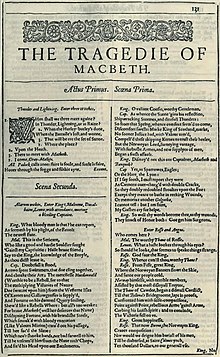
Macbeth Page 12
We found 233 free papers on Macbeth
Essay Examples
Overview
Macbeth Plot Analysis
Macbeth
Element Definition ACT the Play Exposition What you need to know. Background information is presented, main characters are introduced, and the conflict is established. Machete’s encounter with the three weird sisters. Lady Machete’s reaction and response to the news of Machete’s predicated rise to the crown. Rising Action The conflicts and challenges encountered by the…
The Butcher and Fiend Side of Macbeth Analysis
Macbeth
Throughout the play, many opinions are expressed about Macbeth. At the start Shakespeare engages the audience’s sympathy for him by revealing the positive way in which Macbeth the character is perceived by others. Macbeth is deeply lauded and very highly thought of by King Duncan but the way in which we see Macbeth start to…
Macbeth Imagery of Act One
Macbeth
Shakespeare’s use of imagery in act one enhances my understanding of the play. The opening scene creates a vivid image of the witches through strong graphic imagery. Shakespeare skillfully utilizes darkness imagery in order to convey the play’s theme and create a dramatic atmosphere. In act one, scene one, the visual dramatics are emphasized as…
The Real Power: Lady Macbeth Analysis
Macbeth
Power is a subject used by Shakespeare throughout the drama Macbeth. The secret plan involves Macbeth seeking to derive more power. Lady Macbeth attempts to convert Macbeth to kill Duncan so that he will go male monarch in his topographic point. Macbeth besides is persuaded to kill anyone who threatens his opportunities of being male…
Macbeth Tragedy Or Satire Research
Macbeth
Tragedy
Macbeth: Calamity or Sarcasm William Shakespeare wrote four great calamities, the last of which was written in 1606 and titled Macbeth. This “ calamity ” , as it is considered by social critics of yesterday s literary universe, scrutinizes the evil dimension of struggle, offering a dark and glooming ambiance of a universe dominated by…
Macbeth Research Paper
Macbeth
Macbeth was one of William Shakespeare’s finest dramas. Although many people have read Macbeth, non many people know that King Macbeth of Scotland really existed and what influenced Shakespeare to compose about him. English civilization and society every bit good as the historical figure Macbeth impacted Shakespeare’s ill-famed drama. The historical King Macbeth reigned in…
Who is Responsible for Macbeths Downfall?
Macbeth
All the tragic events in “Macbeth” can be attributed to Macbeth, Lady Macbeth, and the three witches. Lady Macbeth persuades Macbeth to act, he prioritizes ambition over conscience, and the witches implant the desire for kingship in his mind. Nonetheless, I hold that Macbeth is primarily responsible as he had the option to kill or…
Macbeth Downfall Research Paper In William
Macbeth
In William Shakespeare’s Macbeth, the chief character, Macbeth, is a brave and loyal topic to the King of Scotland, but as the drama progresses, his character begins to alter drastically. Evil and unnatural powers, every bit good as his ain desire to go male monarch, take over his better half and finally take to his…
The Theme of Kingship Is Examined in the Play of Macbeth
Macbeth
‘The theme of kingship is examined in Shakespeare’s play Macbeth’ discuss this statement with reference & quotation. Shakespeare’s tragedy Macbeth details the fall from grace of its tragic hero, as he struggles with his conscience and ambition in his quest for the throne of Scotland. Macbeth’s desire for power and King Duncan’s unpolluted goodness are…
Macbeth Imagery Research Paper
Macbeth
The drama Macbeth is good known for its abundant usage of imagination. Imagery is used for legion grounds such as to convey certain visions to the audience and to give life to the drama. One major usage of imagination can be seen with the character of Lady Macbeth. Her word picture is strongly dependent on…
| originally published | 1606 |
|---|---|
| description | Macbeth is a tragedy by William Shakespeare; it is thought to have been first performed in 1606. It dramatises the damaging physical and psychological effects of political ambition on those who seek power for its own sake. |
| setting | Macbeth is set during the 11th century in Scotland, in the northernmost region of what is now the United Kingdom. ... Over the course of the play, Macbeth moves from his castle in Inverness to the royal palace in Dunsinane., |
| characters | Macbeth, Banquo, Lady Macbeth, Macduff, King Duncan, Three Witches, Malcolm |
| antagonist | Macduff |
| quotations | “By the pricking of my thumbs, something wicked this way comes.”“Infirm of purpose!”“More is thy due than more than all can pay.”“I have bought golden opinions from all sorts of people.”“The attempt and not the deed confounds us.” “Out damned spot!” |
| climax | CLIMAX · Macbeth's murder of Duncan in Act II represents the point of no return, after which Macbeth is forced to continue butchering his subjects to avoid the consequences of his crime. ... By that model, the climax of Macbeth is the fight between Macduff and the Scottish King., |
| information | Playwright: William Shakespeare Central theme: The main theme of Macbeth —the destruction wrought when ambition goes unchecked by moral constraints—finds its most powerful expression in the play’s two main characters. Macbeth is a courageous Scottish general who is not naturally inclined to commit evil deeds, yet he deeply desires power and advancement., |

